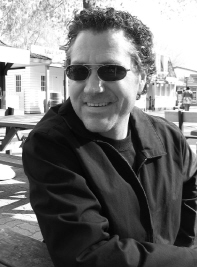The Weight of Stones (31 page)
In the middle of a winter's night. Dark and quiet. He finds himself standing barefoot on cold tiles in the bathroom taking a long piss, head back, fingers tickling his belly. He yawns, closes the toilet lid and moves to the sink, splashes warm water on his face, slicks the water through his hair with his fingers. He pats his face dry with a hand towel. Then he notices it, an extra toothbrush in the holder on the counter. He picks it up, turns it in his hand. Pink, a perfectly traditional match for his blue toothbrush, and he sees the bristle ends are frayed where Hattie has brushed too hard, like a little kid. He sets the brush back in its place. It looks good there, he thinks.
Earlier the room had been filled with the scent of their love, but now the dark bedroom smells only of linen and closed air, the way any bedroom smells in winter. He lifts the heavy comforter and crawls inside. Slides against Hattie's body, warm and soft. She is still half asleep, and she adjusts her body so that a strand of her long hair falls across his face. He reaches up to move the hair, and he smells the fruit shampoo she uses. He notices everything. The freckles on her shoulder blades, the curve of her hips, the feel of his big hand across her soft belly.
“Charlie?” she says in a sleep-thick voice.
“I'm right here,” he says.
“I had a dream about you,” she says, her voice drifting.
“Was it a good one?” he says.
But she is already gone again, lightly snoring. He closes his eyes and listens to the sound of her breathing, and after a while he can make out even the faintest ticking of his wrist watch on the night table. He holds on to her body beneath the winter blankets and believes that he can measure out the time that remains to him in easy moments such as this. He sees that it can be done, that a man can believe himself destroyed, and yet still find something, anythingâa single blade of grassâto clutch. He understands something profound has been forever altered within his being, within his very heart of hearts, and there will never be another family like the one he made from the ground up. But he sees that it can be done, that a man can in fact be annihilated, yet rise from the ashes, rise up from the depths of hell itself and learn to breathe again, and yes, even smile, and never again take for granted the simple luxury of a woman's touch.
Earlier, fingering the patch of flayed grey flesh at his thigh, Hattie had said, “Does it hurt?”
He'd said, “Not too much. Only when I pick at it.”
“Then don't pick at it,” she said with a laugh.
“I can't help it,” he'd said. And it was true.
Now Charlie McKelvey closes his eyes and lets out a long breath. His arm is falling asleep, turning to pins and needles. He adjusts himself so that he will not wake her, slips his arm from beneath her side. He rests a forearm across his forehead, the way he remembers his father doing when they took midday naps to escape the apex of the summer sun up at the camp in the woods of the north, his silent father's strength there with him now, and he feels an unsolicited tear roll from the corner of his eye as an image forms, a flashing arc. His one and only boy. Gavin is turning slowly, smiling up at him. They are skipping stones across the green-blue water of a lake. He feels the presence of their bodies as strong as the sun on a hot day, hears each of their hearts beating, just slightly out of time.

C.B. Forrest began his career in Journalism and currently works in Communications and Marketing. His fiction includes the award-winning short story “The Lost Father” as well as the novella titled
Coming
To,
which was adapted to the stage in 2001. His poetry has appeared in
Contemporary Verse 2, Bloodlotus
Journal, Bywords Quarterly Journal
and
Ascent
Aspirations
, and has earned praise from writers as varied as George Elliot Clarke and Stephen Reid. He lives in Ottawa with his wife and daughter. He is currently at work on a second McKelvey novel.
He can be visited online at
www.cbforrest.com
With gratitude
to Sylvia McConnell and Allister Thompson
Acknowledgements
The author wishes to gratefully acknowledge Gary Marsh, Chris Nuyens, and Gord Rowland for providing invaluable reader comments on early drafts; Pauline Braithwaite for reading those stones and never losing faith; Greg Poulin for the adaptation; spiritual encouragement from Patty Brundritt; mom and dad for the first typewriter; and B.W. Powe for the condensed MA in Creative Writing.
Several sources of information were helpful during the writing of this book, including offline conversations with a few ex-convicts, most notably P.M. and R.D.; knowledgeable former C.O.'s at the Kingston Penitentiary Museum; an interview with inmate âS.D.L.' at Collins Bay Penitentiary; observances at Courtroom #5; and solid crime reporting in the
Montreal Gazette,
the
Toronto Star
, the
Toronto Sun,
and
Ãllo Police.